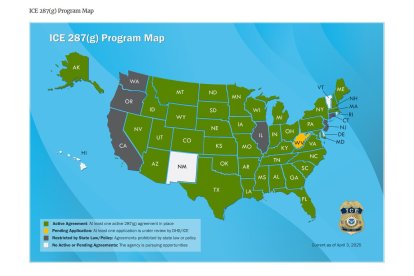Sheriffs and state prosecutors roll up their sleeves to combat illegal immigration: more than 400 local authorities cooperate with ICE
According to federal data, some 170 local law enforcement agencies signed cooperation agreements with the Trump Administration to perform immigration duties during their "routine police duties."

Federal agents during an operation
Across the country, local officers are taking immigration control into their own hands. Since Donald Trump's inauguration, ICE signed more than 400 agreements delegating immigration tasks to state, municipal or city law enforcement.
This is indicated by federal data reviewed by VOZ, which put the number of agreements signed between federal agents and their local counterparts at 444. Covenants covering 38 states, from Florida to Alaska, from Maine to Arizona.
Some of them, even in sanctuary states. Of the 13 so called sanctuary states by the think tank Center for Immigration Studies, four of them: New York, North Dakota, Utah and Massachusetts. (Colorado also signed one, but five years ago).
Six other sanctuary states prohibit such collaborations: California, Connecticut, Illinois, New Jersey, New Jersey, Oregon and Washington. In the remaining two, Rhode Island and Vermont, ICE says it is "pursuing opportunities" for collaboration.

ICE map showing states where it collaborates with local authorities (in green) and where it is prohibited (gray).
"We’re going to assist where they ask us to assist, but we’re not going to go rounding people up at beef farms," said Crow County Sheriff Eric Klang in the Democratic state of Minnesota. His office signed an agreement on March 25.
Those words were picked up by the local news Sahan Journal, critical of the measure. Klang also stated there that of the 50 deputies on his staff, four will receive training from the federal agency. Although he said that details remain to be defined, he assured that his team will only apply immigration legislation to those who commit serious crimes.
Thousands of encounters as a result of federal-local collaboration
Although the Trump Administration seems to want to give a new impetus to these collaborations, the proposal dates back decades. Called Program 287(g), it was added to federal immigration law in 1996.
In 2024, ICE asserted that more than 12,600 encounters with illegal immigrants had taken place in nearly two years thanks to the program. More than 460 of them had convictions for assault, more than 560 for dangerous drug offenses and more than 780 for sexual harassment or abuse.
In its report for February of this year, ICE reported 962 arrests and 170 deportations. Although it did not update the total number, in March it recorded new cases: that of a Mexican citizen convicted of sex crimes, found by the Arizona Department of Corrections.
That of an immigrant from Bulgaria, arrested for domestic violence by the Frederick County Sheriff's Office. Also, in North Carolina, an undocumented immigrant arrested with methamphetamines and "drug paraphernalia."

Society
ICE arrests 133 illegal immigrants, including three convicted murderers, during New York raid
Williams Perdomo
Three types of collaborations
The 287(g) Program allows local authorities to perform "specified immigration officer functions," under the "direction and oversight" of ICE.
There are three types of collaborations: the Deputy Services Officer Model, the Prison Enforcement Model and the Task Force Model.
The former is limited to training for state or lower strata officers to execute civil immigration warrants on individuals in their prisons. The second allows for the identification and processing of removable aliens who are detained by local law enforcement.
The last functions as a "force multiplier," according to the agency. It allows local law enforcement to exercise "limited" immigration tasks during their "routine police duties." As of April, 178 local bodies applied for this model.
The latter was revived by Donald Trump during his second term. Although from the government they highlight its ability to enhance the promised immigration offensive, critics point to the lack of training of local uniformed personnel - which could, they say, result in errors or abuses -, as well as in the possible abandonment of specific tasks of local forces.
One of the most well-known was the agreement initialed by Texas Attorney General Ken Paxton to form a Task Force statewide: "I am proud to be the first to join him to restore our national sovereignty, secure our border, and ensure that criminal aliens face the justice they deserve."
"As the top law enforcement official in Texas, I call on all agencies and departments to join me in the fight," Paxton added, being heard by counties such as Goliad, Bee and Calhoun. All three agreed to form their own task forces.
More could follow in their footsteps: ICE is currently processing applications from 66 other agencies in 13 states for one of the three models.

























